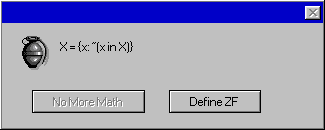It's not. Mathematical proofs are exactly as buggy by nature, it's just that their readers are more permissive than a compiler. Similarly, the readers of a computer program are easily fooled into believing it is correct, at least until they try to run it.
For example, if we try to translate a mathematical proof into a formal language like ZFC, it will also contain bugs. That's because these proofs can get really long so we're forced to write a program to generate the proof. Few people go to the trouble, at their peril, although there is active research in formalizing foundational proofs.
And indeed, math can get BSOD! It wouldn't be the first time!
This orthodox idea that all mathematical proofs which have been sufficiently verified are essentially correct or can be made correct is the same one motivating your software project at work: as long as we stay on the roadmap, we'll get all the bugs out and the features complete — it's an iterative process leading to a definite final product.
Here's the flip side. Look, we've already got the funding, validated the business concept, all the documents are right here for you to read. We just need you to execute and it's a sure thing!
Let's not feel too sorry for Hilbert either, he knew what he was getting into. It's just business.
If you want to be really sure, take everything on a case-by-case basis and draw your own conclusions!

